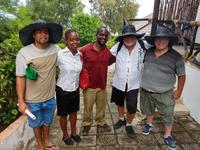
Recycling Networks
Short description
Millions of informal waste pickers collect household waste daily in cities around the globe to earn a living. In doing so they make a significant contribution to reducing the carbon footprint of cities, recovering resources, improving environmental conditions and health of low-income residents, creating jobs and income among the poor.
Recycling Networks – grassroots resilience tackling climate, environmental and poverty challenges
Aim and research questions
The project aims at examining the challenges that innovative grassroots networks encounter and the livelihoods they generate, to improve recycling and household waste collection in informal settlements of global South cities. Strengthening of such initiatives, networks and practices promotes grassroots resilience, contribute to reduce both the adverse impact of cities on climate and environmental change (UN sustainable development target 11.6) as well as urban poverty (UN sustainable development goal 8). The project offers a critical inter- and transdisciplinary perspective on the issue of organizing resilience against climate and environmental change through grassroots initiatives such as cooperatives, associations, communitybased organizations, public-private partnerships and networks.

The project addresses the following questions:
Q1. Processes: How do these grassroots initiatives and networks operate to bring about socio-environmental and economic change?
Q2. Challenges: What are the organizational, institutional, social, and material challenges encountered in the creation, development and stabilization of these initiatives and
networks?
Q3. Opportunities: How can such difficulties be overcome?
Methodology
The project's methodology is inspired by participatory action research through a combination of:
a) a multiple case study on waste picker initiatives in Managua (Nicaragua), Dar es Salaam (Tanzania), Buenos Aires (Argentina) Sâo Paulo (Brazil) and Kisumu (Kenya), based on interviews, observations, workshops and document analysis.
b) joint knowledge co-production with regional and global waste picker networks performing as knowledge hubs for the project.
c) An in-depth case study of the city of Kisumu, where the learnings from the multi-case studies will be integrated.
d) International joint research and waste picker seminars to co-produce knowledge to conceptualize solutions to the challenges.
Theories
Theoretically, the project will contribute to applying and expanding a combination of theories of socio-environmental (e.g. Mair & Marti 2006) and institutional entrepreneurship (e.g. Hardy & MacGuire 2008) with resilience (e.g. Folke, 2006) and grassroots innovation theories (e.g. Smith et al, 2017).
Preliminary results
•The potential of informal recycling networks to create green employment growth and recycling jobs among low-income residents.
•Waste management pilot projects supporting social entrepreneurs have transformed city management practices in informal settlements, leading towards hybrid models that
combine formal and informal practices, with modern and traditional technologies.
•Small-scale waste pickers initiatives providing household waste collection in informal settlements provide innovative solutions driven by a rationality to address social and
environmental challenges in their neighborhoods.
•They also transform the institutional arrangements improving political, legal and organizational conditions for the delivery of environmental services; challenge notions of the public and
responsibility in environmental governance .
•Unlike the standardized knowledge generated by donors and international organizations through ‘best practices’, easy to pack but often difficult to replicate in other contexts, these
South-to- South bottom-up networks bring in locally developed, innovative and flexible solutions, and also learnings from their failures.
•The co-production of novel knowledge by practitioners and scholars, that help understanding the challenges of grassroots resilience for a low carbon society, in the context of Southern cities.
Research team
• Jutta Gutberlet, Professor in Geography, University of Victoria, Canada, and Federal University of the ABC Region in São Paulo, Brazil
• Jaan-Henrik Kain, Professor in Urban Transformation. Chalmers University of Technology, Sweden.
• Michael O. Oloko, Senior lecturer in Environmental Engineering. Jaramogi Oginga Odinga University of Science and Technology Kisumu, Kenya.
• Goodluck Charles, Coordinator of Centre for Policy Research and Advocacy at the University of Dar es Salaam Business School, Tanzania.
• Jessica Pérez Reynosa, Associate professor in Business Administration, University of Central America, Nicaragua.
• Patrik Zapata, Professor in Public Administration, School of
Public Administration, University of Gothenburg, Sweden
• Sebastián Carenzo, researcher at CONICET; senior lecturer at the Institute for the Study of Science and Technology, National University of Quilmes, Argentina.
• María José Zapata, sociologist, Associate professor in Business
Administration, University of Gothenburg, Sweden, project leader.




